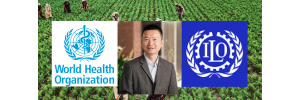Working under the sun creates a large risk of skin cancer, “causing 1 in 3 deaths from non-melanoma skin cancer.”
The World Health Organization and International Labour Organization (WHO/ILO) Technical Advisory Group on Occupational Burden of Disease Estimation, which includes our Center’s own Dr. Jian Li, UCLA School of Public Health and School of Nursing faculty member, has recently published new Joint Estimates on the burden of non-melanoma skin cancer attributable to occupational exposure to solar ultraviolet radiation.
A Joint Press Conference was held on November 8, 2023, at WHO headquarters in Switzerland to brief the global media of these new Joint Estimates. Director-General of WHO, Dr. Tedros Adhanom Ghebreyesus, spoke on the estimates in a video message here. Media outlets such as CNN and VOA have already reported on this release.
These WHO/ILO Joint Estimates are being launched in:
- Joint Press Release
- Journal article: “Global, regional and national burdens of non-melanoma skin cancer attributable to occupational exposure to solar ultraviolet radiation for 183 countries, 2000–2019: A systematic analysis from the WHO/ILO Joint Estimates of the Work-related Burden of Disease and Injury”
This co-launch is the first global estimates of the burden of non-melanoma skin cancer attributable to occupational exposure to solar ultraviolet radiation.
TAKE-AWAYS: 1 in 3 deaths from non-melanoma skin cancer are caused by working under the sun. The research finds that outdoor workers carry a large burden of non-melanoma skin cancer and calls for action to prevent this serious workplace hazard. According to the joint estimates, 28% of all working-age people (15 years or older) were exposed to solar ultraviolet radiation while working outdoors in 2019. In 2019 alone, almost 19,000 people in 183 countries died from non-melanoma skin cancer due to having worked outdoors in the sun. The majority (65%) were male.
The publication calls for governments to establish, implement and enforce policies and regulations that protect outdoor workers from sun-induced skin cancer by providing shade, shifting working hours away from the solar noon, providing education and training, and equipping workers with sunscreen and personal protective clothing (such as broad-brimmed hat, long-sleeved shirts and long trousers).
Other WHO resources:
Online application with: interactive map; data disaggregation tool; data downloading tool.



